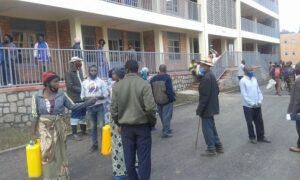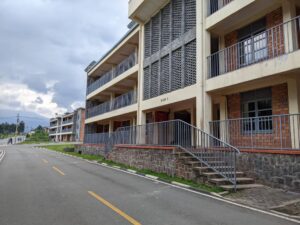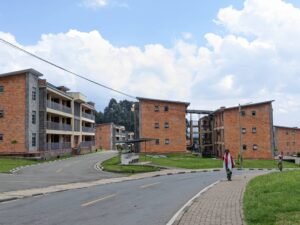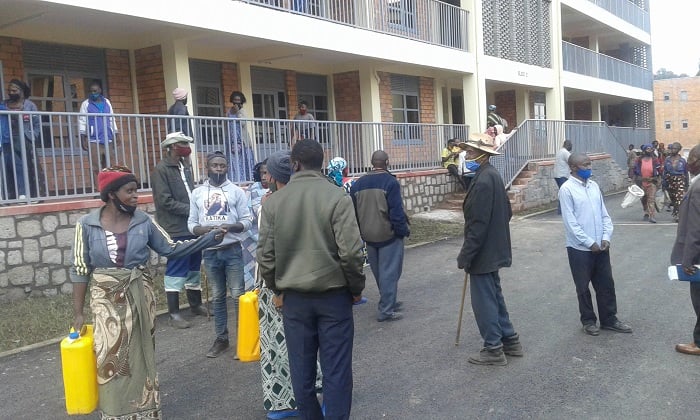Kinigi model village residents call for solutions to persistent challenges
Residents of the Kinigi IDP Model Village appreciate the progress they’ve made in being resettled with access to essential infrastructure, including clean water, electricity, healthcare facilities, roads, and other amenities. However, they highlight ongoing challenges that require urgent attention.

The 144 families, including those relocated from high-risk areas and others previously homeless, were resettled in July 2021 in the Kinigi Sector of Musanze District.
Upon settlement, the residents were provided with 8,000 chickens and assisted in forming a cooperative to manage egg production. This initiative aimed to create financial opportunities and combat malnutrition.
Each family receives at least 10 eggs per month. However, residents told Greenafrica.rw that the eggs they are given are often broken and of questionable quality, making them difficult to use.
One resident explained, “We receive eggs, but they’re always broken. It’s impossible to boil them properly because they dissolve in water, making them unusable. Most of us make omelets, but I believe we lose many of the nutrients found in properly boiled eggs.”
Another pressing issue concerns the houses, which are showing signs of smoke damage due to poor kitchen designs. The kitchens are attached to the living areas, and most residents cannot afford charcoal or refill the gas cylinders they were initially provided with. As a result, they resort to firewood for cooking.

One resident stated, “Both charcoal and gas are extremely expensive now. Most of us here cannot afford them. Imagine someone who was already struggling financially having to spend at least 25,000 RWF per month on cooking fuel. Many of us gather firewood instead because it’s the only option.”
He added, “Some houses are stained with smoke, and cleaning them without repainting is nearly impossible. When we cook, the smoke spreads throughout the house, making life unbearable. The only solution we see is for the authorities to build separate kitchens to prevent further damage to these homes.”
Residents also express frustration over unfulfilled promises regarding farmland within the village’s boundaries. Initially, they were assured access to these plots for farming. However, upon arrival, they discovered the land was being cultivated by individuals they allege to be local officials.
Meanwhile, some families are worried about exorbitant water bills, amounting to hundreds of thousands of Rwandan Francs, for water they claim they did not use.

One resident explained, “Some of us have been billed 800,000 RWF, while others are charged 300,000 or 400,000 RWF. At first, we thought it was a mistake by WASAC, but after investigation, we found these charges are for water used during the construction of this village. Now, it feels like we’re being held accountable for those debts.”
Residents fear that their water supply could be cut off if the debts remain unpaid. They urge the government to intervene and resolve the issue.
One resident added, “We constantly live in fear that we might wake up one day to find our water supply shut off. The government needs to address this debt so we can live in peace without worry.”
While the Kinigi Model Village, which cost over 20 billion RWF to construct, has brought significant changes to the lives of vulnerable families, its residents hope for lasting solutions to their challenges to fully enjoy the benefits of this ambitious project.
The residents of Kinigi Model Village, while grateful for the improvements made so far, continue to face significant challenges that hinder their full integration into a stable and thriving community. Their concerns extend beyond just infrastructure, touching on basic living conditions, economic opportunities, and social justice.
The community remains hopeful that their voices will be heard and that the government and relevant authorities will take action to address these pressing issues. The villagers have emphasized that while the provision of infrastructure like water, electricity, and healthcare is commendable, the ongoing issues with housing, food security, and economic stability need urgent attention for the long-term success of the village.
With the promise of agriculture being a cornerstone of their livelihoods, they continue to advocate for access to fertile land, better support for local farming initiatives, and a fair distribution of resources. The struggle for equitable access to farming land remains a key point of contention, as many residents feel excluded from opportunities that were initially promised.
As the residents of Kinigi Model Village continue to push for better living conditions, the community’s call for intervention is clear: sustainable development and social equity should go hand in hand. With the construction of the village costing over 20 billion RWF, there is an expectation that the government and other stakeholders will ensure that the promises made to these families are fulfilled, providing them with the foundation they need for a prosperous future.

